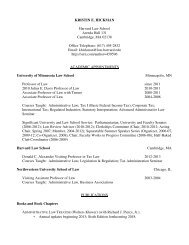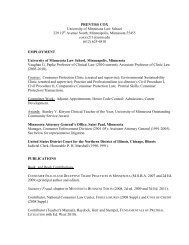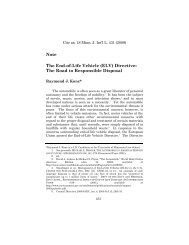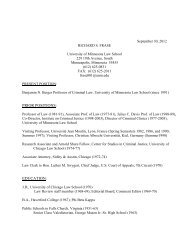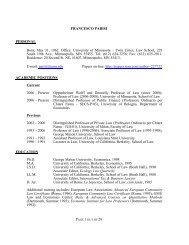Enabling Private Ordering - the University of Minnesota Law School
Enabling Private Ordering - the University of Minnesota Law School
Enabling Private Ordering - the University of Minnesota Law School
You also want an ePaper? Increase the reach of your titles
YUMPU automatically turns print PDFs into web optimized ePapers that Google loves.
2009] UMBRELLA CLAUSES 45<br />
<strong>the</strong> classification <strong>of</strong> a contract as investment-related. They<br />
merely allow breaches <strong>of</strong> investment-related contracts that<br />
qualify as investment under <strong>the</strong> relevant investment treaty to<br />
be brought under <strong>the</strong> treaty-based dispute settlement<br />
procedure. 116<br />
Allowing claims for commercial breaches <strong>of</strong> investmentrelated<br />
contracts to be brought before treaty-based tribunals as<br />
a violation <strong>of</strong> an umbrella clause does not run counter to <strong>the</strong><br />
nature <strong>of</strong> investment arbitration ei<strong>the</strong>r. 117 Instead, <strong>the</strong> ICSID<br />
Convention has not exclusively, nor even primarily, been<br />
designed for disputes to be heard under investment treaties, but<br />
ra<strong>the</strong>r intended to establish a forum for <strong>the</strong> settlement <strong>of</strong><br />
disputes concerning <strong>the</strong> interpretation and breach <strong>of</strong> contracts<br />
between investor and States based on a contractual arbitration<br />
clause. 118 In fact, <strong>the</strong> earliest disputes under <strong>the</strong> ICSID<br />
Convention have all been contract-based disputes. 119<br />
Nor does <strong>the</strong> settlement <strong>of</strong> contractual investor-State<br />
disputes under investment treaties threaten <strong>the</strong> sustainability<br />
<strong>of</strong> <strong>the</strong> system <strong>of</strong> investment arbitration because <strong>of</strong> an<br />
unmanageable increase in <strong>the</strong> number <strong>of</strong> disputes. Instead, <strong>the</strong><br />
structure <strong>of</strong> investment arbitration based on ad hoc arbitration<br />
panels allows setting up third-party dispute resolvers in a<br />
flexible manner whenever <strong>the</strong> need arises. Unlike a standing<br />
court with a fixed number <strong>of</strong> judges, <strong>the</strong> institutional dispute<br />
settlement structure is <strong>the</strong>refore able to adapt flexibly as <strong>the</strong><br />
demand for dispute resolution by <strong>the</strong> parties arises. Clogs <strong>of</strong> <strong>the</strong><br />
docket or judicial backlog are <strong>the</strong>refore not a concern that<br />
should militate for a restrictive interpretation <strong>of</strong> umbrella<br />
investment and is <strong>the</strong>refore outside <strong>of</strong> <strong>the</strong> scope <strong>of</strong> application <strong>of</strong> umbrella clauses<br />
ratione materiae.<br />
116. See infra Part V.A.<br />
117. But see Wälde, Contract Claims, supra note 4, at 226 (“If <strong>the</strong> pacta sunt<br />
servanda clause applied to ‘any contract’ <strong>of</strong> foreigners with any governmental entity<br />
or State enterprise, <strong>the</strong>n <strong>the</strong>re is a risk that BIT tribunals would indeed become<br />
courts <strong>of</strong> first instance or an appeal authority for any <strong>of</strong> <strong>the</strong> innumerable contract<br />
disputes likely to arise.”).<br />
118. See Aron Broches, The Convention on <strong>the</strong> Settlement <strong>of</strong> Investment Disputes<br />
between States and Nationals <strong>of</strong> O<strong>the</strong>r States, 136 RECUEIL DES COURS 331, 342–48<br />
(1972-II) (on <strong>the</strong> historical backdrop <strong>of</strong> establishing <strong>the</strong> ICSID Convention, which<br />
consisted in a lack <strong>of</strong> dispute settlement mechanisms); see also id. at 352–54<br />
(pointing out that consent to arbitration under <strong>the</strong> ICSID Convention could be given<br />
ei<strong>the</strong>r in an investor-State contract, in an investment treaty, or in domestic<br />
legislation).<br />
119. See CHRISTOPH SCHREUER, THE ICSID CONVENTION: A COMMENTARY, 89–<br />
94 (2001).




